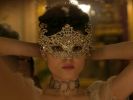Eye For Film >> Movies >> Matilda (2017) Film Review
Matilda
Reviewed by: Amber Wilkinson

Watching Aleksey Uchitel's lovingly mounted, unashamedly romantic costume drama it's hard to believe that it caused such a political stir in his home country of Russia before its release. It tells - with more than dusting of fairy tale - the story of tsar-in-waiting Nicholas II (Lars Eidinger) and his romance with ballerina Matilda Kshesinskaya (Michalina Olszanska), prior to being wed and becoming emperor. The problem for the story in Uchitel's homeland is that, since Nicholas and his family were killed by the Bolsehviks in 1918, they have gone on to be canonised by the Russian Orthodox Church.
This meant that some, including Russian MP Natalia Poklonskaya, campaigned against the film. More hard-line objectors even went so far as to stage arson attacks and send threatening letters to cinemas, prior to the film's release - a situation Uchitel has branded as "absurd".

The furore may, ironically, help the film to get the attention at an international level that it deserves purely on its own merits - there's nothing like a 'scandal' to drive box office. But Uchitel must have had an eye on the global markets from the beginning, as the crew and cast are multinational, including Germans Eidinger and Luise Wolfram (who plays the Tsar's wife-to-be Alix) and fast-rising Polish star Olszanska (The Lure, I, Olga Hepnarová). Even without its cross-border credentials, however, it's impossible to deny the high level of accomplishment on display - from the meticulous costuming by Nadezhda Vasileva and Olga Mikhailovaf through to the palatial settings in St Petersburg.
We pick up the story before Nicholas has truly begun to struggle with the cloak of power - which, in one of the heavier metaphors in the film, will go on to be represented by an outsize crown. Although, as was common throughout Europe, deals have been struck to shore up power through marriage, his father encourages him to play the field, until a fateful train crash - the gripping staging of which blasts the recent Murder On The Orient Express off the track.
With his father's health now failing, Nicholas finds his head turned by young ballerina Matilda, a situation exacerbated by a spot of wardrobe sabotage which, in the only moment of nudity in the film, leaves the dancer with a breast exposed during a sell-out performance. As the pair's bond grows stronger, Nicholas finds himself torn between the call of duty and the pull of his heart.
Eidinger and Olszanska bring the full chemistry set to the table as the star-crossed lovers, but Wolfram's Alix is not left out in the cold by scriptwriter Alexander Alexandrov (writing in collaboration with Uchitel and Michael Katims), even if their attempt to evoke the shadow of Rasputin through mystic Doctor Fishel (Thomas Ostermeier) results in a daft and largely redundant subplot involving a young soldier's (Danila Kozlovsky) unrequited love for Matilda. Scenes in a hokey laboratory only serve to undermine the believability all round. Alix, although in some ways made a victim by Nicholas' shenanigans, always retains a sense of agency, even if she feels her destiny has been mapped out for her.
Aided by colour coding of the costumes - red unsurprisingly stands for danger - Uchitel and his cinematographer Yury Klimenko maintain a heightened sense of emotion, letting the camera drink in the ornate ceilings or ballerinas’ pirouetting exertions to give the film a strong sense of place. Scenes of intimacy are also well-handled, relying not on nudity but a sense of erotic longing generated by the characters that marries well to the film's overall themes of conflicting desires and obsession.
Those who enjoy costume melodrama, from The Red Shoes to Joe Wright’s Anna Karenina, will thrill to the spectacle. Meanwhile, British audiences are likely to spot parallels between this story and Edward VIII, Nicholas' cousin once-removed, although that tale of 'forbidden romance' would, of course, play out very differently.
If Nicholas' indecision starts to grate, that is surely part of the point, speaking to the bigger picture of more serious problems that would be experienced during his reign. While some of the peripheral storylines distract from the central theme, the heart of Uchitel's film beats strongly.
Reviewed on: 28 Nov 2017
















